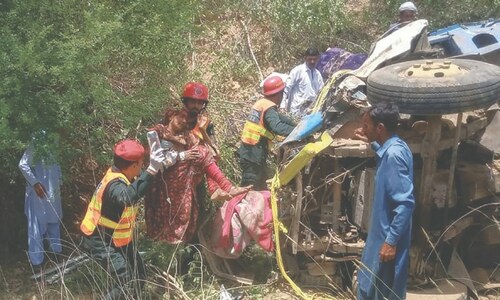 BRUSSELS, May 5: Nato and Pakistan are set to strengthen and widen relations to establish a “mature political dialogue”, Nato Secretary-General Jaap de Hoop Scheffer said ahead of a ground-breaking visit to Islamabad, starting on Monday.
BRUSSELS, May 5: Nato and Pakistan are set to strengthen and widen relations to establish a “mature political dialogue”, Nato Secretary-General Jaap de Hoop Scheffer said ahead of a ground-breaking visit to Islamabad, starting on Monday.
Mr Scheffer, who will be accompanied by Nato’s top military commander Gen John Craddock, is the first head of the 26-nation alliance to visit Pakistan. Discussions in Islamabad are planned with President Gen Pervez Musharraf, Prime Minister Shaukat Aziz and other senior officials.
Asked if Nato governments were still critical of Pakistan’s efforts to rein in the Taliban and stop cross-border movement of insurgents, Mr Scheffer told Dawn in an interview in Brussels that all players in Afghanistan had to step up action against the “spoilers”.
“There is always room to do more for all of us --- but I say explicitly that this is true for all of us, not only for Pakistan. If the border is a problem, Pakistan should get as much assistance as it can get to do proper surveillance of that very difficult border,” the Nato chief insisted.
“We take this visit to Islamabad very seriously,” said Mr Scheffer. In addition to the existing “well-functioning” military-to-military relations established within the so-called Tripartite Commission, including senior military representatives from Afghanistan, Pakistan and Nato’s International Security Assistance Force (Isaf) in Afghanistan, the Nato chief said both Pakistan and the alliance agreed there was “room for strengthening and widening our political dialogue.”
The situation in Afghanistan will be a key topic during discussions in Islamabad. But Mr Scheffer insisted the alliance was also seeking to upgrade its bilateral relationship with Pakistan.
“Nato and Pakistan in their own right have every reason to have a mature political dialogue,” said Mr Scheffer.
In addition to high-level contacts and visits, the alliance chief said he believed there could be closer ties between Nato and Pakistani think tanks and Pakistani military officers could attend courses organised by Nato while Nato could also learn a great deal from Pakistan.
Contacts between Nato and Islamabad should be at “different levels,” he underlined, adding: “I think there’s a lot we have to discuss.”
Mr Scheffer said Nato had built up “confidence and trust” in Pakistan through its massive humanitarian aid operation which followed the devastating October 2005 earthquake in Kashmir. The alliance airlifted close to 3,500 tons of urgently-needed supplies to Pakistan during a three-month period and deployed engineers, medical units and specialist equipment to assist in relief operations. The mission came to an end, on schedule, on February 1, 2006.
After the relief operation and Nato-Pakistan military cooperation in Afghanistan, “the moment now has come for me to strengthen our political dialogue,” he said.
With up to 36,000 NATO troops stationed in Afghanistan as part of international efforts to stabilise the country --- and many soldiers engaged in daily battles in southern Afghanistan with a resurgent Taliban ---- Mr Scheffer said Afghanistan would “clearly be an important subject” during his talks in Islamabad, adding that he wanted to listen to Pakistan’s views on the situation.
Al Qaeda operatives engaged in combat with Nato in Afghanistan were also seeking to destabilise Pakistan, said Mr Scheffer. “Pakistan and Nato are on the same side here because the very people who want to spoil Nato’s endeavours in Afghanistan in favour of reconstruction and nation-building are also the people who want to have a go at the very fabric of Pakistani society,” he remarked.
“So I think we are in the same boat here --- we have a lot in common,” he said.
The Nato chief said he believed Pakistan and Nato shared a common desire to see stability in Afghanistan, adding: “This is part of a fight on the frontline against terrorism. President Musharraf is fighting that fight as hard as we are.”
Mr Scheffer focused on the need for “good relations” between Pakistan and Afghanistan, adding that he was pleased that Nato-member Turkey had recently organised a meeting between President Musharraf and his Afghan counterpart Hamid Karzai.
“I only hope Presidents Karzai and Musharraf continue talking to each other --- it is important they do so,” said Mr Scheffer, adding: “It is only by talking and relating to each other that common problems can be solved.”
The Nato chief denied that the alliance was seeking a regional role or intended to advise President Karzai on running the country. “The Afghan people own Afghanistan, it is their nation. It is up to them how they want to arrange and organise relations,” he said. “I am not the one who is going to give a recipe on what President Karzai should do.”
However, he insisted that “there should be room for every Afghan citizen from whatever background” in the country. Asked if President Karzai should talk to the more moderate Taliban leaders, Mr Scheffer said: “That is not my call. Nato is not a regional player. It has a United Nations mandate to create a climate of security and stability in Afghanistan.”
He emphasised the importance of “good governance” in Afghanistan and urged a “vigorous” fight against corruption and “war-lordism”.
Mr Scheffer said the international community must step up aid coordination in Afghanistan, saying that while different organisations were getting better at working together, “we can do better.” However, developing Afghanistan was a generational challenge that required sustained, long-term effort, the Nato chief said.















































Dear visitor, the comments section is undergoing an overhaul and will return soon.